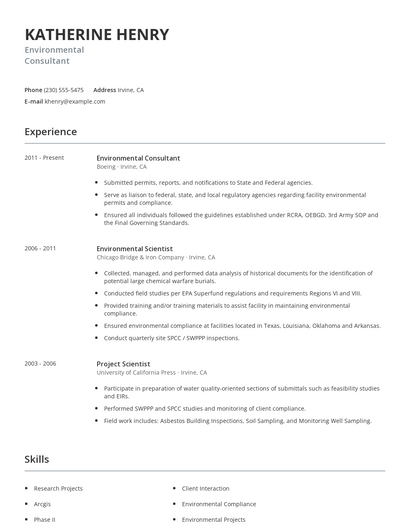
The SWCA (San Francisco Water Conservation Association) is a non-profit that works towards conserving natural resources, and helping people live better lives. Onsite Environmental Consulting, is an example. This site allows applicants to anonymously upload their resumes. Employers are able to quickly find the best candidates for any given job. In addition, they provide a list of local job openings and provide links to potential employers. This organization is a great way to start a career, but it does have some serious problems.
Onsite Environmental Consulting
SWCA Environmental Consultants includes Onsite Environmental Consulting. They are a Jacksonville, Florida-based consulting firm that provides an array of environmental services, including water quality monitoring, habitat restoration, and stakeholder engagement. Their environmental consultants combine scientific expertise with knowledge of permitting and compliance protocols to provide cost-effective solutions to clients' environmental challenges. For more information about Onsite Environmental Consulting, please contact them today. These are their top capabilities:

Primary industries in the SWCA
Read on if your interest is in joining SWCA's team of Environmental Consultants. Learn about SWCA's main industries and who they serve. The firm's employees will also be revealed, along with alternative spellings. Our main industries include:
Its CEO
Joseph J. Fluder III, the CEO of SWCA, is passionately committed to delivering sound science and creating an inspiring and rewarding environment for employees. As president of the company and CEO, he assists SWCA leadership with strategic vision and strategy development. He is a strong advocate for SWCA's uniqueness and scientific and technological prowess and helps to maintain the company's employee ownership structure.
Its political affiliations
After recent revelations that an undercover cop was spying on UW students, Student Worker Coalition is investigating the student worker coalition's political affiliations. The SWC, or Student Workers Council, holds open meetings to organize a campus demonstration on May 3. In an April 8 meeting, a woman named Tani, a UW alumna, attended. SWC members confronted him in his police uniform during questioning. He admitted to being the woman who had attended the meeting as Tani.

Its employee information
Zippia offers an in-depth analysis of SWCA Environmental Consultants' employee data. ZIPpia collects information from both public and private data sources. Employees are required to report their employment history. These sources may include the BLS, company filings, H1B filings, and other public datasets. These data were obtained by SWCA from an online survey.
FAQ
What qualifications are necessary to become a consultant
It's not enough just to have an MBA degree; you must also demonstrate experience working as a business consultant. You must have at least two years' experience working in consulting and/or training within a large company.
You should have had experience working with senior management to create strategy. This requires you to feel confident presenting ideas to clients, and getting buy-in.
A professional qualification exam, such as the Certified Management Consultant (CMC), of the Chartered Management Institute (CMI), is also required.
How do I set up an LLC to consult?
First, you must decide what your goals are as a service provider. Then you need to make sure you are qualified for those services. You might find someone who does the same thing you are interested in and learn from them.
Once you have a clear idea of what you are offering, you can start to identify your target market. If there aren't enough of them, you may need to create them.
You then have to decide whether or not you want to open your own company, or hire other people to do it.
It is possible to also start your own consulting firm by obtaining a license from the State. But this will require a lot more paperwork and legal costs.
Why would a company pay a consultant?
Consultants provide expert advice on how to improve the performance of your business. They are not there to sell you products.
Consulting helps companies make better decisions. They provide sound analysis and offer suggestions for improvement.
Senior management teams often have consultants working closely with them to help them understand their needs.
They provide coaching and leadership training for employees to enable them to achieve their peak performance.
They may advise businesses on reducing costs, streamlining processes, and increasing efficiency.
Statistics
- 67% of consultants start their consulting businesses after quitting their jobs, while 33% start while they're still at their jobs. (consultingsuccess.com)
- "From there, I told them my rates were going up 25%, this is the new hourly rate, and every single one of them said 'done, fine.' (nerdwallet.com)
- According to IBISWorld, revenues in the consulting industry will exceed $261 billion in 2020. (nerdwallet.com)
- My 10 years of experience and 6-step program have helped over 20 clients boost their sales by an average of 33% in 6 months. (consultingsuccess.com)
- According to statistics from the ONS, the UK has around 300,000 consultants, of which around 63,000 professionals work as management consultants. (consultancy.uk)
External Links
How To
What's a typical day like for a Consultant?
Each type of work will dictate the day's pace. You'll spend your time researching new ideas and meeting clients.
Clients will often meet with you to discuss their problems. These meetings may be over the phone via email, on-line, or face-to–face.
You may also be asked to prepare proposals, which are documents outlining your ideas and plans for clients. These proposals should be discussed with a mentor or colleague before being presented to clients.
After all the preparation and planning, it's time to actually create some content. This could include writing articles, designing websites or editing photos.
You may need to conduct research depending on the scope of your project to find relevant statistics and figures. This could include finding out how many customers your company has and whether they purchase more than one product.
Once you have all the information needed, it is time for clients to see your findings. Your findings may be delivered orally, or written.
Finally, you must follow up with clients after the initial consultation. You might contact them regularly to check on their progress or send them emails to confirm they have received your proposal.
Although this process can take time, it is important to stay focused and build good relationships with your clients.